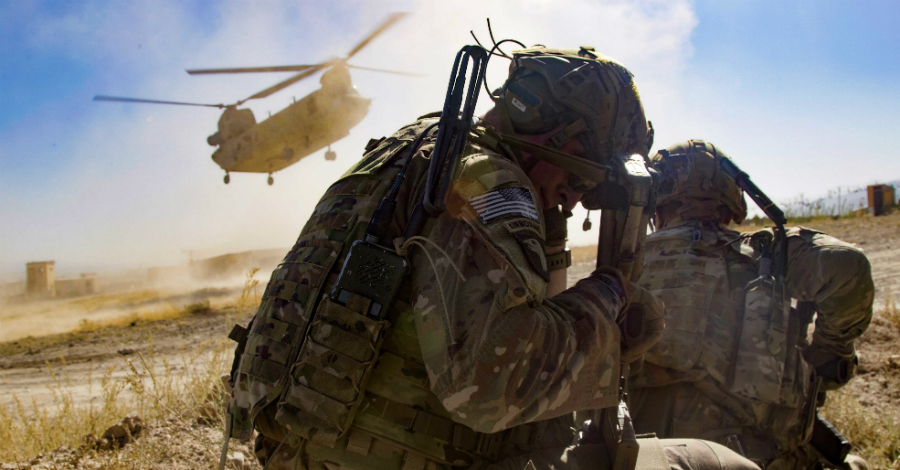What the Washington Post Gets Wrong About the United States and Afghanistan
The Post's claim that successive administrations deliberately lied to the American people goes too far.

Published by The Lawfare Institute
in Cooperation With

Editor’s Note: This article originally appeared on Order from Chaos.
It is a serious charge to accuse U.S. officials of deceit and duplicity in their dealings with the American people. That is arguably what happened in Vietnam, to a large extent—helping explain why the 1960s were among the worst decades in American history in terms of domestic cohesion and trust. Now, the Washington Post has accused U.S. officials of both parties and several recent administrations of a similar pattern of untruthfulness in regard to the American-led mission in Afghanistan since 2001. Does this charge hold up?
The short answer is no. The Washington Post did a disservice with this report. At a time when trust in American institutions is already weak, and U.S. officials accuse each other of lying all the time, the country does not benefit from yet more of its trusted voices being wrongly demeaned and diminished.
Yes, the Afghanistan experience these last 18.5 years has been marked by tragedy, frustration, many failures, and a general sense of disappointment. Even those of us who generally have supported the mission would acknowledge as much. But no, there has not been a campaign of disinformation, intentional or subliminal.
It is fine to accuse many elected leaders, ambassadors, generals, and other officials of endorsing bad policies—and not seeing clearly or quickly enough when those policies were failing. That is much different, however, than an assault on the integrity of those individuals. To be sure, wishful thinking afflicts public servants as much as other human beings, and people who favor one policy or another sometimes spin the facts to suit their pre-determined argument. But that is much different than intentional and concerted efforts to lead the country astray. And for every person attempting positive spin about the Afghanistan mission over the years, there have usually been several harping on all the problems.
Indeed, very few American leaders have ever seen Afghanistan through rose-colored glasses. Consider:
- The Bush administration attempted an “economy of force” or light footprint mission in Afghanistan from roughly 2002-07, partly because of the competing demands of the Iraq war but also because Afghanistan was seen as neither important enough, nor promising enough, to merit much more.
- Then-Secretary of Defense Robert Gates underscored that, even as we decided to devote more resources to Afghanistan in the late 2000s, we were not trying to create “Valhalla” there. The reference prompted many Google searches, but caused little controversy because few had high expectations for Afghanistan in the first place, and few found it surprising that our real goals were in fact modest (and often unmet).
- The early 2009 Afghanistan policy review by Bruce Riedel, Richard Holbrooke, and Michele Flournoy (which explicitly stated that the United States was losing the war) was designed and described as a fast-moving stopgap effort to prevent further deterioration of a rapidly worsening situation—one that candidate Barack Obama had chastised the Bush administration for tolerating as it swung its main policy focus to Iraq from 2003 onward and lost focus on what, in Obama’s mind, should have been the main effort. (The Special Inspector General for Afghanistan Reconstruction didn’t interview Riedel or his deputy in the Afghanistan-Pakistan review conducted that year.)
- The General Stanley McChrystal policy review in the summer of 2009 described corruption in the Afghan government as a threat to the mission on par with the physical menace posed by the Taliban. Much of the urgency in his request for tens of thousands of additional forces arose from the fact that the very viability of the country was at acute risk.
- The ensuing White House review in the fall of 2009 reflected President Obama’s uncertainty about whether a big additional effort in Afghanistan was really worth it. The president’s December 1 West Point speech that year announcing a big, but temporary, surge of forces conveyed at once a palpable sense that the mission was in trouble and a simultaneous, if somewhat oxymoronic, attempt to push the Afghan government to do more about that threat itself. Again, there was no happy talk in the speech. When Obama had positive things to say about the general Afghanistan theater thereafter, he focused on things like the successful raid on Osama bin Laden’s compound in May 2011 and his promise to draw down U.S. forces in the country by one-third prior to the 2012 presidential election. He certainly was not crowing about huge nation-building accomplishments.
- U.S. leaders like then-Secretary of State Hillary Clinton did trumpet the enormous gains made in women’s rights, child survival, educational opportunity, a free press, and an open political system in various speeches in the late 2000s and early 2010s. But they were right to do so, given facts on the ground, and given the contrast with what Afghanistan had endured in the horrible years of the 1980s and 1990s.
- Throughout the second Obama and first Trump terms, there has been a near-constant flurry of almost annual Afghanistan policy reviews. They always start with the same premise: that we should try to extricate ourselves from a difficult, if not failing, situation with whatever reasonable exit strategy we can collectively concoct. Unfortunately, no one has figured out a way to leave entirely yet. So far, the argument that always carries the day, in the inner sanctums of Washington power as well as on the campaign hustings, is that we cannot afford again to abandon the country from which the 9/11 attacks were originally planned. Counterterrorism and protection of the U.S. homeland have been the goals people could agree on. Grandiose claims of turning Afghanistan into the next Asian tiger have been few and far between throughout these debates.
The Washington Post is right to document, for the umpteenth time, the lack of progress in fighting opium production, making Afghanistan safer for its citizens, reducing government corruption, and building Afghan security forces that can handle the job without us (though it is worth noting that those forces now do in fact hold all major and mid-sized cities, and do perhaps 95% of the fighting and more than 99% of the dying among coalition forces these days). It is wrong—badly wrong—to claim to have proven that the Bush, Obama, and/or Trump administrations, as well as top military and diplomatic leaders charged with the Afghanistan mission, systematically and intentionally misled the country about what was going on.


.jpg?sfvrsn=407c2736_6)


